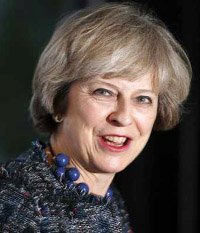
Reuters, London :
In the hours before Theresa May stepped to the podium in Birmingham earlier this month to lay out her vision for a “fully independent, sovereign” Britain, she made a discreet round of telephone calls to European leaders.
Her aim, according to British officials, was to head off any surprise or confusion in Berlin, Paris, Brussels and other capitals over the message she was about to deliver to hundreds of her Conservative Party colleagues.
In the speech, May described the Brexit referendum in June as “the biggest vote for change this country has ever known.”
She promised to trigger divorce proceedings with the European Union by the end of March next year and she rejected the notion that Britain might opt for a deal similar to those of Norway or Switzerland – two non-EU countries that adhere to the bloc’s rules on free movement of people in exchange for privileged access to its lucrative single market.
The message proved a hit with the eurosceptic Brexiteers in the audience, just as May’s aides had hoped. But investors took fright, pushing the British pound to its lowest level against the dollar in over three decades.
And May’s attempt to soften the blow with her European partners backfired. The basic facts may have matched what she told her counterparts in Europe, but the tone of her speech and the strident tenor of the Tory conference in general sent shockwaves across the continent.
In Berlin, German Chancellor Angela Merkel was mystified by May’s metamorphosis from a quiet “remain” supporter to what seemed like a passionate crusader for a hard break from Europe, according to people in her entourage. The British seemed intent on “talking themselves into isolation,” an official close to the chancellor said.
Within days, Merkel and others hit back. European Commission President Jean-Claude Juncker promised the EU would be “intransigent” with Britain. European Council President Donald Tusk described the choice for May’s government in binary terms – either “hard Brexit” or no Brexit. The message from Europe was clear: If a rupture was what May wanted, then that is what she would get.
In the hours before Theresa May stepped to the podium in Birmingham earlier this month to lay out her vision for a “fully independent, sovereign” Britain, she made a discreet round of telephone calls to European leaders.
Her aim, according to British officials, was to head off any surprise or confusion in Berlin, Paris, Brussels and other capitals over the message she was about to deliver to hundreds of her Conservative Party colleagues.
In the speech, May described the Brexit referendum in June as “the biggest vote for change this country has ever known.”
She promised to trigger divorce proceedings with the European Union by the end of March next year and she rejected the notion that Britain might opt for a deal similar to those of Norway or Switzerland – two non-EU countries that adhere to the bloc’s rules on free movement of people in exchange for privileged access to its lucrative single market.
The message proved a hit with the eurosceptic Brexiteers in the audience, just as May’s aides had hoped. But investors took fright, pushing the British pound to its lowest level against the dollar in over three decades.
And May’s attempt to soften the blow with her European partners backfired. The basic facts may have matched what she told her counterparts in Europe, but the tone of her speech and the strident tenor of the Tory conference in general sent shockwaves across the continent.
In Berlin, German Chancellor Angela Merkel was mystified by May’s metamorphosis from a quiet “remain” supporter to what seemed like a passionate crusader for a hard break from Europe, according to people in her entourage. The British seemed intent on “talking themselves into isolation,” an official close to the chancellor said.
Within days, Merkel and others hit back. European Commission President Jean-Claude Juncker promised the EU would be “intransigent” with Britain. European Council President Donald Tusk described the choice for May’s government in binary terms – either “hard Brexit” or no Brexit. The message from Europe was clear: If a rupture was what May wanted, then that is what she would get.

